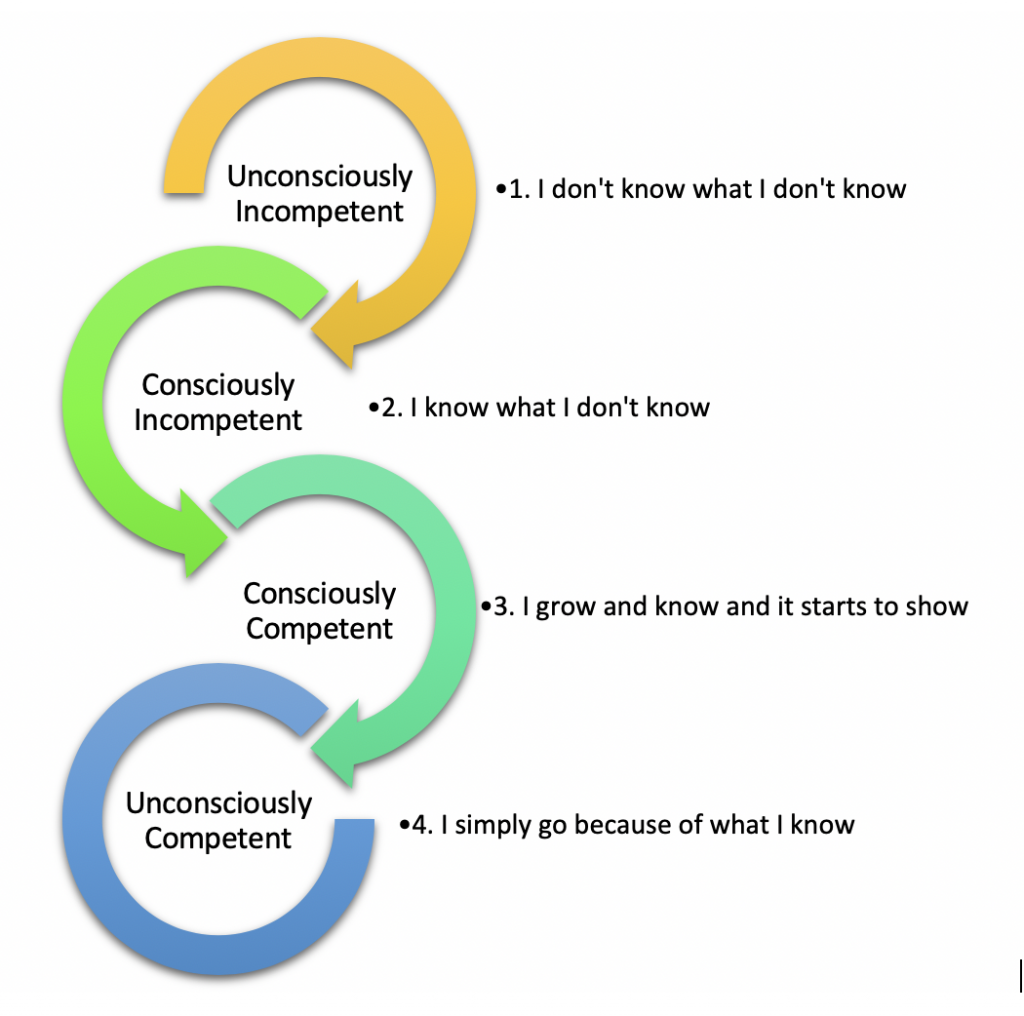To become an unconsciously competent facilitator, you first become conscious and then competent. As you progress and increase your abilities, you will note an evolution of competency, illustrated in the chart below. First, note that consciousness precedes competence. You do not achieve a consistent level of success until you have developed consciousness about what is required. Secondly, you will discover that the amount of time between each of the stages decreases as you make progress. Let’s look at each of the stages and the aphorisms offered up by John Maxwell that capture the sentiment of each stage.
Unconsciously Incompetent
Before you undertake a complex activity, you slumber through an area of unconscious incompetence. You may linger at this stage for decades. Look at the amount of time it takes to discover the difference between well-run and poorly-run meetings. In this stupor, you “do not know what you do not know.” You lack both knowledge and skills and are unaware of your incapacity.
Consciously Incompetent
Yet another stage remains before you become competent. Here you develop increased consciousness. During this stage, you also develop aspirations and hopes. You begin to envision yourself as competent and contributory. You may linger in this state for a long time, depending on your determination to learn and the real extent to which you accept your incompetence. Most importantly, your consciousness enables you to observe and identify the characteristics of competency, typically in others, as you begin to “know what you don’t know.”
Consciously Competent
Cast into the role of facilitator, you find yourself slipping into and out of competency. You can increase the consistency of your competency by taking formal training, practicing, participating with others who aspire to be better, and obtaining valuable feedback. Developing competence occurs much quicker than developing consciousness. Practice, training, and feedback help because they increase your consciousness. You “grow and know and it starts to show.”
Unconsciously Competent
With repetitive practice and experience, you reach a point where you no longer need to think about what you are doing. You become competent without the significant effort that characterizes the state of conscious competence. You will drift in and out of unconscious competence, based on the skills you master quickly. It takes little time to become unconsciously competent, only practice. Here your services are requested “because of what you know.” Eventually, you know that it feels right and you do it.
Howell (1982) originally describes the four stages:
“Unconscious incompetence – this is the stage where you are not even aware that you do not have a particular competence. Conscious incompetence – this is when you know that you want to learn how to do something but you are incompetent at doing it. Conscious competence – this is when you can achieve this particular task but you are very conscious about everything you do. Unconscious competence – this is when you finally master it and you do not even think about what you have such as when you have learned to ride a bike very successfully”
— (Howell, 1982, p.29-33)
See also: Howell, W.S. (1982). The Empathic Communicator University of Minnesota: Wadsworth Publishing Company
Remember, consciousness precedes competence, and superb competence does not take much time, but it does take practice. We hope you are getting your fair share of challenges and seize the opportunity for more practice and feedback.
For a six-minute video presentation on The Four Stages of Consciousness, turn here.
______
Don’t ruin your career by hosting bad meetings. Sign up for a workshop or send this to someone who should. MGRUSH workshops focus on meeting design and practice. Each person practices tools, methods, and activities daily during the week. Therefore, while some call this immersion, we call it the road to building high-value facilitation skills.
Our workshops also provide a superb way to earn up to 40 SEUs from the Scrum Alliance, 40 CDUs from IIBA, 40 Continuous Learning Points (CLPs) based on Federal Acquisition Certification Continuous Professional Learning Requirements using Training and Education activities, 40 Professional Development Units (PDUs) from SAVE International, as well as 4.0 CEUs for other professions. (See workshop and Reference Manual descriptions for details.)
Want a free 10-minute break timer? Sign up for our once-monthly newsletter HERE and receive a free timer along with four other of our favorite facilitation tools.

Terrence Metz, president of MG RUSH Facilitation Training, was just 22-years-old and working as a Sales Engineer at Honeywell when he recognized a widespread problem—most meetings were ineffective and poorly led, wasting both time and company resources. However, he also observed meetings that worked. What set them apart? A well-prepared leader who structured the session to ensure participants contributed meaningfully and achieved clear outcomes.
Throughout his career, Metz, who earned an MBA from Kellogg (Northwestern University) experienced and also trained in various facilitation techniques. In 2004, he purchased MG RUSH where he shifted his focus toward improving established meeting designs and building a curriculum that would teach others how to lead, facilitate, and structure meetings that drive results. His expertise in training world-class facilitators led to the 2020 publication of Meetings That Get Results: A Guide to Building Better Meetings, a comprehensive resource on effectively building consensus.
Grounded in the principle that “nobody is smarter than everybody,” the book details the why, what, and how of building consensus when making decisions, planning, and solving problems. Along with a Participant’s Guide and supplemental workshops, it supports learning from foundational awareness to professional certification.
Metz’s first book, Change or Die: A Business Process Improvement Manual, tackled the challenges of process optimization. His upcoming book, Catalyst: Facilitating Innovation, focuses on meetings and workshops that don’t simply end when time runs out but conclude with actionable next steps and clear assignments—ensuring progress beyond discussions and ideas.




